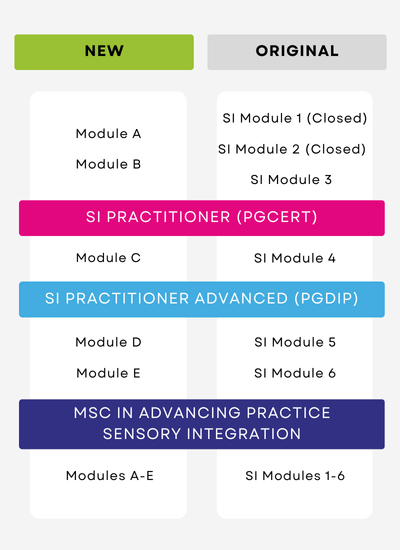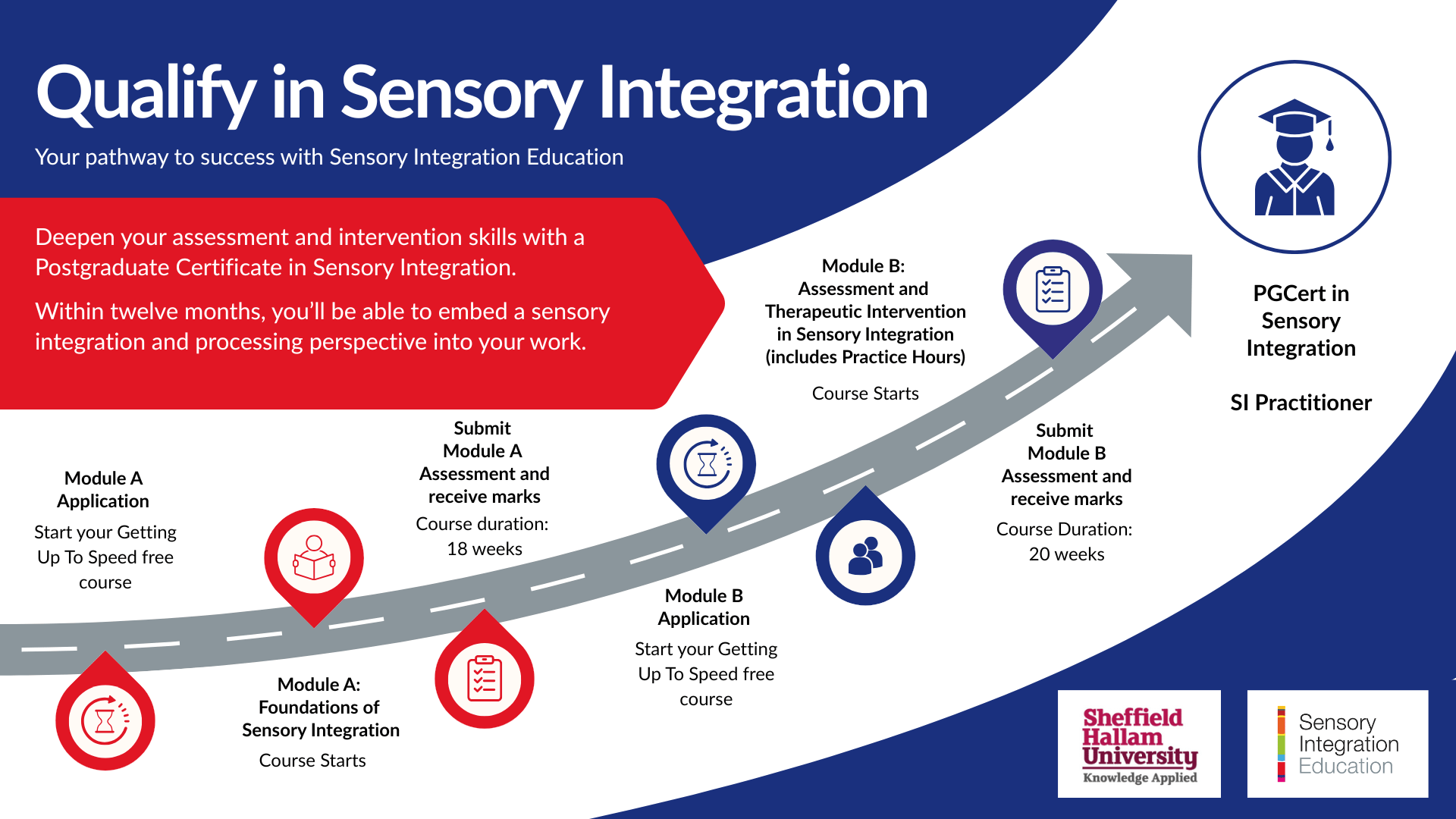Postgraduate Qualifications in Sensory Integration
University-Accredited Postgraduate Training in Ayres Sensory Integration®
30+ years of impact • 100,000+ learners • Rated 5-star on Trustpilot • 1,700+ reviews
Pick the route that matches your goals. You can study one module at a time - and progress as far as you wish.
SI Practitioner
Complete within 12 months
SI Practitioner (Advanced)
Complete within 19 months
SI Practitioner (Advanced)
Complete within 36 months
Clinical Mentoring: included if you have a workplace mentor.
If you choose an external mentor, budget approx. £50/hr (2 hrs in Module B, 3 hrs in Module C).
Interest-free payment plans available. No VAT to pay (SIE is not VAT registered).
Our postgraduate pathway is designed for qualified health and care professionals who want to train in sensory integration practice.
You’ll need:
- A relevant professional qualification and/or registration (depending on pathway)
- Clinical access to relevant client groups
- Commitment to reflective practice and skills development
As an Occupational Therapist, you help people of all ages live fuller, more independent lives. But when sensory processing differences are present, everyday tasks - from dressing and eating to focusing and participating - can become overwhelming or impossible. Becoming a qualified Sensory Integration Practitioner gives you the knowledge and tools to assess and address these challenges with confidence.
As a Speech and Language Therapist, your work in supporting communication, eating, drinking, and swallowing relies on finely tuned sensory and motor systems. Sensory processing differences can significantly impact these areas, making it vital to understand and address them in your assessments and interventions.
But did you know that sensory processing plays a critical role in movement, body awareness, balance, and postural control? Sensory integration knowledge enhances physiotherapy practice by giving you deeper insight into the "why" behind your clients’ physical challenges. By evaluating how your clients process sensory input, you’ll better understand their movement patterns and functional limitations. Our evidence-informed CPD courses and SI Practitioner qualification provide you with the knowledge and tools to integrate sensory approaches confidently into your clinical practice.
As a registered nurse, you’re already skilled in holistic, person-centred care. Adding a sensory integration qualification deepens your ability to assess and respond to the complex needs of individuals across the lifespan - especially those with neurological, developmental, or mental health conditions.
* NMC (or equivalent) registered Nurses can take Module A and Module B to become a Sensory Integration Practitioner and gain a PGCert in Sensory Integration.
As a Clinical or Educational Psychologist, you're trained to explore how people think, feel, learn, and behave. But many of the emotional, behavioural, and learning challenges your clients face may be rooted in - or significantly affected by - sensory processing differences.
* HCPC (or equivalent) registered Practitioner Psychologists (including clinical and educational psychologists) can take Module A and Module B to become a Sensory Integration Practitioner and gain a PGCert in Sensory Integration.
HCPC (or equivalent) registered professionals:
Modules A-C (PGCert / PGDip)
Module A Only
Other suitably qualified professionals will be considered on a case-by-case basis.
New 2026 Pathway (Modules A–E)
Same accreditation partner (Sheffield Hallam University), same expert teaching and mentor support - now restructured into clearer modules and timelines.
Understand SI theory, sensory processing patterns, and how sensory integration impacts participation and function.
Develop assessment capability, interpretation skills, and clinical reasoning for SI-informed formulation and planning.
Build intervention planning skills and advanced application for complex clinical presentations.
Develop research literacy, ethics, methodology, and the ability to appraise evidence confidently.
Conduct your own research project with structured academic support.
Our postgraduate pathway is designed for busy clinicians and structured for real-world learning.
You’ll get:
Online access 24/7
Learn in your own time with high-quality teaching resources and clear pacing.
Live teaching and interaction
Sessions and activities designed to help you integrate theory into clinical reasoning.
Supportive learning community
Peer learning, reflective tasks, and shared practice development.
Journal Club
Stay connected, supported, and current - with guided reading and discussion.
Clinical application built in
You’ll be supported to apply learning to your practice (with supervision/mentorship embedded where needed).
We are now transitioning to restructured modules, maintaining the same excellent quality standards and support. The award-winning Sheffield Hallam University remains the accrediting university.
You can book one or more modules at a time. Modules must be completed in order.

Module A: Foundations of Sensory Integration - Click Here
(18 weeks)
Module B: Assessment and Therapeutic Intervention in Sensory Integration (PGCert) - Click Here
(20 weeks)
Module C: Advancing Practice in Sensory Integration (PGDip) - Click Here
(22 weeks)
Module D: Research and Innovation in Healthcare Practice - Click Here
(12 weeks)
Module E: Dissertation in Health and Social Care Practice (MSc) - Click Here
(48 weeks)
PGCert in SI (Modules A and B) must be completed within 12 months.
PGDip in SI (Modules A, B, and C) must be completed within 19 months.
MSc Advancing Practice in SI (Modules A-E) must be completed within 36 months.
| NEW Pathway | |
| Module A, B or C | £1,750 each |
| Module D | £885 |
| Module E | £2,655 |
| Modules A-E | £8,790 in total |
| SIE is not VAT registered | No VAT to Pay |
| * Interest-Free Payment Plans: Modules A, B or C |
5 x monthly payments of £350 |
| Payment Plan for PGCert (A+B) | 10 x monthly payments of £350 |
| Payment Plan for PGCert (A+B+C) | 10 x monthly payments of £525 |
* Payment plans available for self-funding students only. The first instalment is due 15 days after booking.
Discounts: A 5% discount is available for single orders of £10,000 or more.
Potential Additional Cost:
Clinical Mentor Sessions:
You may:
Use a workplace-based clinical mentor at no additional cost, or
Arrange an external clinical mentor (approx. £50 per hour).
We know this is a meaningful commitment of both time and money and that most learners need to plan ahead, secure funding, or spread payments over time. The good news is: you don’t have to figure it out alone.
Funding options (most learners use one of these)
1) Employer Funding
Many learners are funded by employers (NHS services, schools, charities, and private practice). If you’re seeking support, we provide practical templates to help you make a clear business case.
Click Here to Download a Template to Request NHS Funding for Your Sensory Integration Training
Click Here to Download a Template to Request Funding From Your Employer for SI Training
2) Interest-free Payment Plans (self-funding)
If you’re funding your place personally, interest-free payment plans are available so you can spread costs over manageable monthly instalments.
|
* Interest-Free Payment Plans: Modules A, B or C |
5 x monthly payments of £350 |
| Payment Plan for PGCert (A+B) | 10 x monthly payments of £350 |
| Payment Plan for PGCert (A+B+C) | 10 x monthly payments of £525 |
* Payment plans available for self-funding students only. The first instalment is due 15 days after booking.
3) Postgraduate Loan Funding (MSc route)
If you plan to complete the full MSc (Modules A–E), you may be eligible to apply for a UK postgraduate loan (subject to your personal eligibility criteria).
Click Here to explore postgraduate funding options
Our pathway is designed for working clinicians. Learning is flexible and online, but we recommend setting aside protected time each week to stay confident and consistent.
As a guide, many learners plan for:
A regular weekly study slot of approximately 5-6 hours (e.g., split over one evening + a half-day at the weekend)
Extra time around assignment deadlines
Clinical application and reflection as part of workplace learning
Tip: If you’re applying for employer funding, it can help to discuss study time early; even small amounts of protected time can make a big difference.
To set yourself up for success, we recommend you:
Need help deciding the best route?
Click Here to book a call and we’ll guide you through eligibility, pathway options, and funding planning.
See our NEW entry requirements - Click Here.
For course dates and the application form, Click Here.

PGCert in SI (Modules A and B) must be completed within 12 months.
PGDip in SI (Modules A, B, and C) must be completed within 19 months.
MSc Advancing Practice in SI (Modules A-E) must be completed within 36 months.
Your eligibility to transfer depends on the Sensory Integration (SI) modules you have already completed:
If you have completed SI Modules 2, 3, or 4, you may continue on the original programme pathway.
If you have completed SI Modules 1 and 2 with us, you can choose to transfer to the new programme and proceed directly to Module B to complete your PGCert in Sensory Integration.
If you have already completed a PGCert in Sensory Integration with us under the original structure (SI Modules 1, 2, and 3), you may progress directly to Module C to work towards your PGDip in Sensory Integration.
If you completed SI Module 1 within the last five years, you can transfer to the new programme by completing a short bridging unit* before progressing to Module B of the PGCert in Sensory Integration.
The bridging unit (Fee: £500) is designed to build on your existing learning and ensure you have covered the full range of underpinning theory, clinical reasoning, and practical application taught in Module A. This ensures you enter Module B fully prepared and aligned with other students on the new programme.
* Further details about the bridging unit will be available shortly.
(19 weeks)
SI Module 4 (PGDip) Advanced Practice - Click Here
(16 weeks)
SI Module 5 Researching for Practice - Click Here
(12 weeks)
SI Module 6 (MSc) Dissertation - Click Here
(48 weeks)
PGCert in SI (SI Modules 1, 2 and 3) must be completed within 24 months.
PGDip in SI (SI Modules 1, 2, 3 and 4) must be completed within 36 months.
MSc Advancing Practice in SI (SI Modules 1-6) must be completed within 48 months.
| ORIGINAL Pathway | |
|
10 Credit Bridging Unit (For Students who have completed SI Module 1 and need to move on to Module B) |
£500 |
| Modules 3 or 4 | £1,200 each |
| Module 5 | £885 |
| Module 6 | £2,655 |
| SIE is not VAT registered | No VAT to Pay |
| * Interest-Free Payment Plans: Modules 3 or 4 | 4 monthly payments of £300 |
* Payment plans available for self-funding students only. The first instalment is due 15 days after booking.
Discounts: A 5% discount is available for single orders of £10,000 or more.
Potential Additional Cost:
Clinical Mentor Sessions:
You may:
Use a workplace-based clinical mentor at no additional cost, or
Arrange an external clinical mentor (approx. £50 per hour).

Book a call with our Education Team if you’d like to talk through any questions before or after you apply for our postgraduate courses in sensory integration.
Find answers to the most common questions we receive about our postgraduate pathway.
If you have any other questions please ask here.
What is a PGCert, PGDIP, MSc? Click here to find out more.
Click here to find out about support for Disabled Students and Students with Additional Needs.
Click here to find out about Loans, Scholarships, Grants and Bursaries.
If you require a replacement module certificate, please click here.
A Sensory Integration Practitioner is awarded the Postgraduate Certificate in Sensory Integration upon successful completion of Modules A and B (previously 1-3).
An Advanced Sensory Integration Practitioner is awarded the Postgraduate Diploma in Sensory Integration upon successful completion of Modules A, B and C (previously 1-4).
Why Accreditation Matters
Put simply, accreditation provides reassurance for you, your clients or patients, and your employers that the course meets the standards of quality and competence stated on your certificate.
When investing in your professional development, it’s essential to consider not just the qualification a course offers, but also whether its quality and credibility have been independently verified by a recognised authority.
While certification typically confirms that a course meets the standards set by a third party, accreditation goes further. An accredited course has undergone formal review and has been officially recognised as delivering the appropriate levels of academic and professional competence for its level of study.
All modules in our Sensory Integration MSc Pathway, leading to a Postgraduate Certificate, Postgraduate Diploma, or MSc in Advancing Practice in Sensory Integration, are accredited by Sheffield Hallam University in the UK. Only government-recognised institutions can use the title ‘university’ and award or accredit postgraduate degrees, ensuring your qualification meets rigorous national standards.
Yes, successful completion of these modules earns academic credits, typically between 15 and 40 credits per module. UK university credits are internationally recognised and highly transferable.
After successfully completing Modules A and B, you will have achieved 80 academic credits and be awarded a Postgraduate Certificate in Sensory Integration from Sheffield Hallam University. You will also receive the professional title of Sensory Integration Practitioner from Sensory Integration Education.
By completing Modules A, B and C, you will accumulate 120 academic credits and be awarded a Postgraduate Diploma in Sensory Integration from Sheffield Hallam University. This also entitles you to the title Sensory Integration Advanced Practitioner from Sensory Integration Education.
Following the Postgraduate Diploma, you can progress to complete your MSc in Sensory Integration by undertaking two additional modules at Sheffield Hallam University:
SI Module D: Researching for Practice
SI Module E: Dissertation
Please see the university eligibility criteria for a 'break in study' click here.
Have you already taken an SI Module course? Find out which one to take next click here.
You will have 12 months of access to the course content from the course start date.
Unfortunately, we cannot accept late bookings.
If you have studied sensory integration before, you may be able to receive recognition of your prior learning from Sheffield Hallam University.
See further information by clicking here.
Recognition of Prior Learning (RPL) for Module-Only Study
For example if you have completed module A as ‘single module’ only study and then sign up for a PG Dip your award classification will be based only on the grade achieved in Module B and C.

We’ve helped over 2,000 therapists qualify in SI, gaining UK-university accredited postgraduate qualifications and the experience and skills to practise confidently and effectively.

Free guide for Occupational Therapists on the impact that sensory integration training will have on their career and practice.
Free
.jpg)
Use this template to request NHS funding for your Postgraduate Sensory Integration Training starting September 2025. Copy and amend as appropriate - we've filled in the key details for you!
Free
.jpg)
Easily customise this template to request full or part funding from your employer for your postgraduate training in sensory integration. Secure the support you need for your professional growth!
Free
